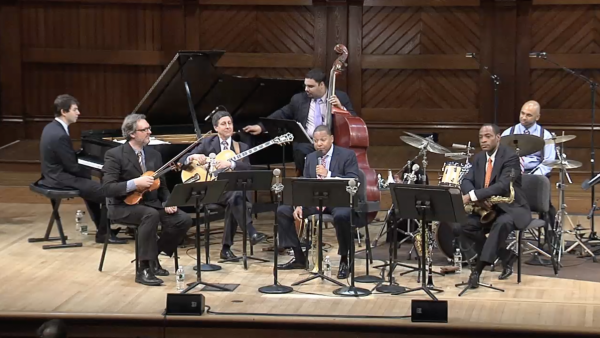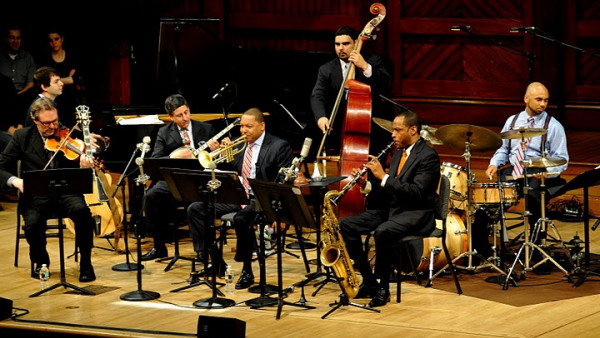“Wynton Goes to Harvard” - An Interview with the Wall Street Journal
Wynton Marsalis Goes To Harvard
(APRIL 18, 2011, 10:38 PM ET)
Pulitzer-prize winning jazzman Wynton Marsalis considers himself both student and teacher of music, which is why it comes as no surprise that his newest undertaking is a two-year lecture series at Harvard University.
Beginning on April 28, Marsalis will lecture and perform a class entitled “Music as Metaphor.” The nine-time Grammy award winner currently serves as the artistic director for Jazz at Lincoln Center, a role he will keep throughout the lecture series. Speakeasy talked with Marsalis about the coming series, his love of last-minute pressures and the concept of improvisation.
Is every lecture in the series already planned?
It’s all planned. I haven’t written them but know what they are going to be. I generally work right up to when I have to do something ““ I’m always doing a lot. My schedule is always tight. But I like to have the pressure of having to finish doing something; it gives me an added edge. It’s like the difference between a studio recording and a live recording ““ there’s more pressure ““ more excitement and edge, which is very seldom, if ever, created in a studio environment.
How far along are you on your first lecture, which is ten days away?
I’ve got what music I’m going to play and all materials and all basic ideas. I write little parts of it as I go along. At this point I’m working on it all day. Generally when I wake up in the morning I set out a series of problems for myself and I write them down and when I’m sleeping my mind solves the problems. When I wake up in the morning I have more clarity on the issue.
The premise of your lecture is the relationship between American music and the American identity and geography. What does that entail?
The fundamentals of American music. I feel that for years of teaching in the country and reading criticism in books, I feel like the things most needed in our culture are the understanding of the meanings of our music. We haven’t done that good of job teaching our kids what our music means or how we developed our taste in music that reminds us and teaches us who we are. Most of my lectures will be on meaning in American music. What does it mean? What are the component parts of it and how does it tie in to our way of life?
Are you nervous?
It’s much harder to play a trumpet that to talk. An instrument poses a difficultly. Whatever that barrier is ““ it doesn’t exist with speaking. With an instrument you have to concentrate on execution on and through your instrument. But I talk all the time, the voice is what it is.
Will the students have to attend each lecture to understand the message or will each class stand on its own?
Each will stand on its own but they will all be together like a train. As a matter of fact that’s part of what I’m talking about. The chorus format form which is we use when we improvise. It’s called a chorus format. You play one chorus after another chorus after another chorus and the choruses allow you to play a variation upon the harmonic form. In that way it’s like a train. It could be two cars, could be engine and a caboose it can also be an engine, 25 cars and a caboose. Those 25 cars are their own cars, some are short some are long, some are tubular, some carry grain ““ and you can look at the different cars ““ each has a different function.
Earlier this month you played the blues with Eric Clapton. Now you are planning a series of lectures for Harvard. How do you juggle so many projects?
I don’t do projects; it’s all one thing to me. Things that Eric Clapton and I talk about are the same things talking about in these lectures. Blues, regional grooves, function rhythm guitar; it’s talking about things in our craft and dealing with our music and playing.
source: http://blogs.wsj.com/speakeasy/2011/04/18/wynton-marsalis-goes-to-harvard/



Comments
I wish there was a way I could listen to these sessions. Wynton Marsalis should write an excellent “curriculum” for elementary music teachers.
Hector on Jun 9th, 2011 at 7:32pm
awesome
David Joseph on May 1st, 2011 at 12:09am